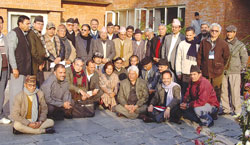|
|
Everyone is curious about a new face that is being seen regularly at high-level meetings. First seen at the meeting to sign the 12-point agreement between the Maoist and the seven parties in 2005, he has been present at all historic meetings since. He was included in a group picture taken after the historic peace agreement in November 2006, and since then more and more people have been asking about him. Our investigation has concluded that this new face is Amresh Kumar Singh (circled in yellow), a former professor of chemistry at Amrit Science Campus.
In the last few months Singh has successfully maintained a low profile, but is said to exert influence in high places. He played an important role in bringing together the Maoists and the parties, and we understand that he has the trust of both Pushpa Kamal Dahal and Girija Prasad Koirala. In fact, he's become so close to Koirala that people in the Nepali Congress who used to try to influence Koirala are starting to be jealous of this new friendship. Singh talked to Ghatana Ra Bhichar about his commitment to the peace process and the making of a new Nepal.
What is your role in the many high-level political meetings at which you've been spotted?
I want the world to know Nepal as a peaceful, developed, democratic country. After 1 February, I could not remain in Nepal, so I moved to India and started working actively to strengthen the loktantrik movement. The political leadership was impressed by my sincerity and commitment, which is perhaps why the leadership trusts me. I used to be involved with the Nepali Congress and in 1997 was appointed a board member of Gorkhapatra. I was in constant touch with Baburam Bhattarai during the second round of talks circa 2002. I firmly believe the Maoists and political parties should work together. I also believe monarchy has to be abolished if we want a truly loktantrik and peaceful Nepal.
You have been linked with the Indian intelligence service (RAW) and New Delhi's South Block.
If a madhesi is politically active, they are automatically linked to either South Block or RAW. There is no truth in these accusations. I'm a student of international relations, and my training teaches that a democratic country should have good relations with all the countries, especially with its neighbours. If people misinterpret my beliefs, it is their problem.
If Nepal were divided according to caste, ethnicity, language, how would that affect our future?
Those who have been oppressed and left behind need to play an active role in the state structure. Those living in tarai are also Nepalis, and need to be treated like they belong. Ignoring the tarai, or failing to address tarai-related issues will only push this country towards more conflict. All Nepalis should be able to proudly say that they are Nepali.



